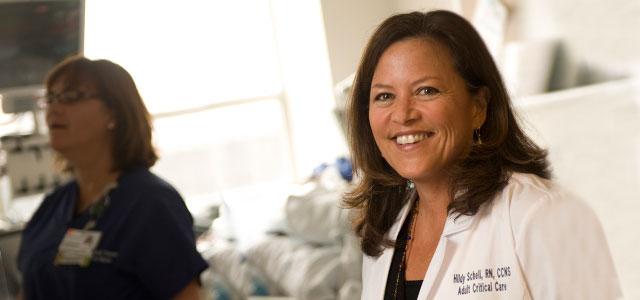
Hildy Schell-Chaple, MS, CNS, associate clinical professor
What Volunteer Clinical Faculty Do: Hildy Schell-Chaple and Critical Care Nursing
Volunteer clinical faculty and preceptors offer students individual perspectives and hands-on experience in a variety of health care settings and specialties. The cumulative effect of what these volunteers impart plays a significant role in the care any health system delivers. This series aims to shed light on the unique roles these valuable mentors play.
This month we hear from Hildy Schell-Chaple, clinical nurse specialist in adult critical care at UCSF Medical Center and associate clinical professor in the Department of Physiological Nursing at UCSF School of Nursing.
I am a native of California and did my undergraduate work at University of San Francisco; that school’s exceptional nursing program allowed me to do clinical rotations at UCSF. It sounds a little cliché, but I truly felt like this work as a nurse was my calling. I weighed it against becoming a physician and am so glad I chose to work in this field, not only because of the amazing rewards from patients, families and colleagues, but also because I have been able to make contributions that make a difference for individuals, groups and systems. Although my husband may chuckle, nursing has afforded me the flexibility to have a balanced life of family and career. I’ve now been with UCSF for 25 years and am proud to be a UCSF nurse.
During my graduate education at UCSF School of Nursing, I was interested in the clinical nurse specialist (CNS) role. At the time, I worked in acute care on the kidney transplant unit, where I was exposed to the impact and influence that the clinical nurse specialist’s practice had on patients’ lives and nurses’ careers. In particular, I was drawn to the CNS’s impact on ensuring that the complex care needs of patients were met, as well as her mentorship and her support for the professional development of nurses. She constantly challenged us to think about our role as professional care providers. Similarly, I had other mentors who created a culture that nurtured this understanding, encouraging me to develop professionally and to present at conferences and national meetings.
I transitioned into critical care to broaden my skills and soon realized that this was where I belonged. Through my work with critically ill patients and their families, my passion for the profession deepened. I worked with some of the most complex cases: a patient with acute lung injury, someone with a huge vascular injury, a post-liver transplant patient whose kidneys stopped working and someone with a bleeding disorder related to a severe infection.
The key to serving such patients is to create a collaborative and highly synchronized team – and that is one of nursing’s most important roles: to coordinate this team from the bedside and make sure the pieces come together to meet the needs of the patient and family. The optimal outcome for a critically ill patient may be survival and return home with family, or it may be a comfortable, dignified end-of-life transition, but optimal outcomes happen only when there is true collaboration among nurses, physicians, social workers, pharmacists, respiratory care providers, physical therapists and nutritionists – and when care aligns with the patient’s goals.
For example, we had a young father with a rare cancer who barely survived his critical illness in our ICU. I worked closely with the nurses, physicians, nutritionist and respiratory therapist to ensure that his transition out of the ICU was smooth – that he was successfully weaned from his tracheotomy tube and that his plan of care was clear about his return to mobility. He and his wife were reassured that those of us who knew him from a month in the ICU were able to inform the new care team of his abilities and needs. I have always found it an honor to be the nurse who is most present with the patient and family during a significant life transition: from critical illness to either recovery or death. In my role as a CNS, one of my responsibilities is to train and mentor other nurses so that they can achieve that honor.
One of the great things about being at UCSF is that the environment places a huge emphasis on teaching and learning. More than 20 years ago, I was asked to be a guest lecturer in a classroom, and my interest in teaching really grew from there. Throughout my career I have had inspiring mentors and preceptors who have taken the time to train me. I really see my clinical faculty role as an opportunity to contribute to this tradition.
From the very beginning, I knew I wanted more than just a student to shadow me. I wanted to make sure my students were learning real skills that they could use to ensure that patients received safe, high-quality care. This means being thoughtful about what I would delegate to students and how I would engage them. I have students collate and synthesize data to exercise their analytical skills. I also ask them to conduct a self-directed project of their own with careful supervision. I test their skills by painting realistic and complex scenarios and then asking them how they would act. When it comes to hands-on training, I have them conduct patient consultations as well. I encourage them to attend meetings and stay current on the most recent evidence and news in the field; to make an impact, they have to be proactive.
Today I am about five years into my PhD work at UCSF, so I am busy balancing work, school and family. My research looks at body temperature alterations and their impact on critically ill patients. There are a lot of beliefs surrounding the role and treatment of fever in critically ill patients but little evidence to support any of those beliefs. We don’t know if we are helping or harming when we routinely treat fevers with antipyretic medications and physical cooling measures (fans, ice packs, cooling blankets).
My doctoral work has made me realize the importance of relevant context. A solid background gives you an essential, deeper understanding of your work. It is this understanding that I try to share with students who work with me. The skills I have gained during my studies have not only allowed me to design and conduct research, but have also provided me with the content and experience to teach nurses how to critically appraise research; this is essential for evidence-based practice. Use of these advanced skills in my role as a CNS enhances my impact on optimizing patient outcomes and broadens the scope of training that I provide to advanced practice nursing students who will be leaders in health care delivery.



